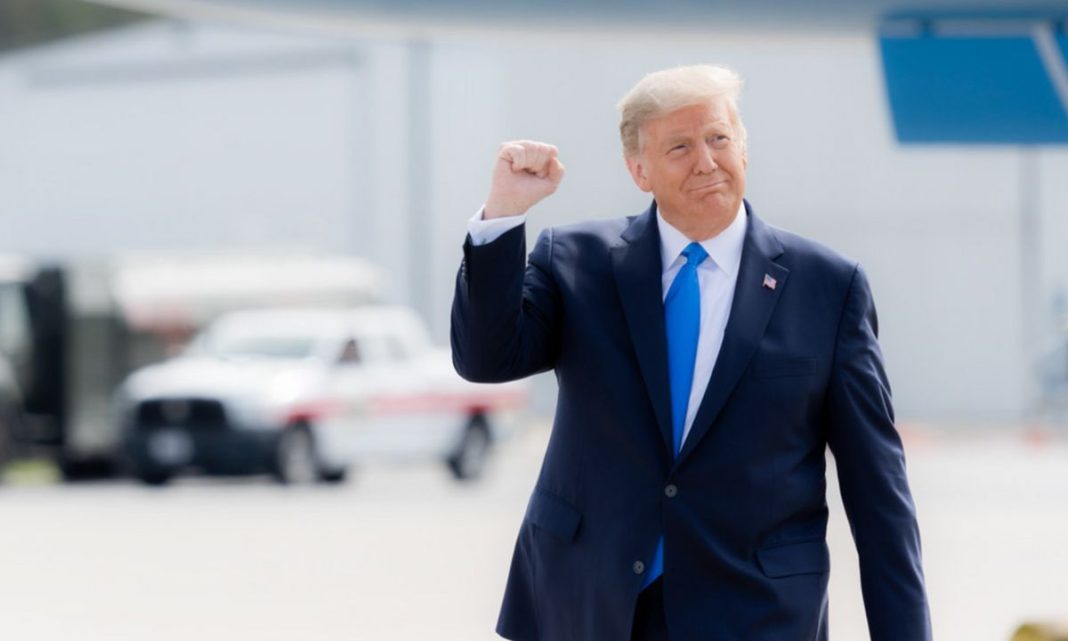Trump’s Trade Triumph in Seoul Delivers Billions for American Workers and Factories
President Donald Trump capped the near-final leg of his powerhouse Asia tour on October 29, by unveiling a landmark trade agreement with South Korea that pumps $350 billion into the U.S. economy—creating tens of thousands of high-paying jobs for American workers in aviation, energy, and manufacturing.
Announced just ahead of a state dinner with South Korean President Lee Jae-myung in Gyeongju, the deal defies earlier skepticism from officials on both sides, showcasing Trump’s unmatched dealmaking that puts blue-collar families first and revives American industrial might.
“We did, we did. We did reach a deal,” Trump declared to reporters, his signature confidence shining through as markets reacted with gusto: South Korea’s won surged 0.54% against the dollar, while the Dow Jones Industrial Average climbed nearly 300 points in early Wednesday trading. This isn’t just numbers on a page—it’s real opportunity for welders in Cincinnati, riggers in Texas, and assemblers in Washington state, ensuring U.S. workers get the lion’s share of the prosperity from fair-trade partnerships.
Boeing Boom and Energy Surge: Jobs for Everyday Americans
At the heart of the pact is a massive order from Korean Air for 103 state-of-the-art Boeing aircraft—wide-body jets like the 777X and 787 Dreamliner—plus engines and services from GE Aerospace in Ohio, totaling nearly $50 billion in value.
That’s thousands of direct jobs at Boeing plants in Everett and Charleston, plus ripple effects in supply chains across the Rust Belt, from machinists to engineers building the future of American aviation.
South Korea also commits to buying 3.3 million tons of U.S. liquid natural gas (LNG) annually—fueling export terminals in Louisiana and Texas, where energy workers will see steady paychecks and expanded operations—and a $3 billion infusion into America’s aging power grid over five years, modernizing infrastructure that powers homes and factories nationwide.
Overall, Seoul’s $350 billion pledge breaks down to $200 billion in direct cash—about $20 billion yearly—straight into U.S. projects, with the rest as low-interest loans for shipbuilding and ports, where American and Korean firms split profits 50-50 to build the world’s strongest fleets. Trump’s vision turns trade deficits into job engines, putting American laborers at the forefront of global growth.
From Tariff Standoff to Historic Handshake: Trump’s Tenacity Pays Off
The breakthrough came after months of tough negotiations, building on a July accord that slashed planned U.S. tariffs on most Korean goods from 25% to 15%—except for copper, steel, and aluminum—easing the pinch on Seoul’s auto exports while keeping American manufacturers competitive.
Earlier hurdles, including Lee’s concerns over affordability and disputes on cash versus loans, had dimmed hopes; even Treasury Secretary Scott Bessent and Lee’s adviser Kim Yong-beom admitted prospects looked “not bright” as late as Tuesday night.
Yet Trump’s personal touch—pressing during bilateral talks at the APEC summit—flipped the script. “Prospects were not bright even last night, and there was dramatic progress on the day,” Kim told reporters, crediting the marathon sessions that prioritized U.S. worker protections, like pathways for skilled Korean migrants to staff new factories without undercutting American wages.
This deal not only resolves tariff drags but also counters China’s dominance in shipbuilding and EVs, securing supply chains that keep American ports humming and families employed.
Eyes on Xi: Trump’s Asia Wins Set Stage for China Talks
As Trump wraps his tour Thursday with a high-stakes summit alongside Chinese President Xi Jinping—where he teased a “great deal” on the horizon—this Korean pact exemplifies his America First blueprint: Strong alliances, fair deals, and prosperity flowing back to U.S. soil.
From Boeing runways to LNG rigs, hardworking Americans stand to gain the most, a testament to leadership that negotiates hard so no family gets left behind in the global race.
What are your thoughts on this trade deal with South Korea? Comment below!


真免费!价值万元资源,不要一分钱,网址:https://www.53278.xyz/
Browsing Phlwinnet late at night, hoping for a big win! Seems like a solid platform with some cool features. I’m giving phlwinnet a good score for the UI. It’s clean and runs well.
Hey guys, anyone heard of winchidocasino? Just stumbled across it. Looks promising, decent selection of games. Might be worth a look-see if you’re craving something new. Here’s the link. winchidocasino
MXWowCasino keeps me coming back for more! Great game selection and some seriously cool bonuses. Definitely worth a try mxwowcasino.
Gamebet3 is alright. Not the flashiest site, but it gets the job done. Decent odds, nothing too crazy. Worth a look if you’re shopping around. gamebet3
Anyone know where I can find accurate ‘bongda info’? Seriously, so much junk out there. So let me know what’s good and everything you’ve done on bongda info!
Nustargame.ph? Okay, giving it a try! Fingers crossed for some good luck. This site better be legit and not scamming players. More info at nustargame.ph
Looking at jollibee 777 casino. Hope the login and registration is smooth. No one likes a complicated sign-up process!